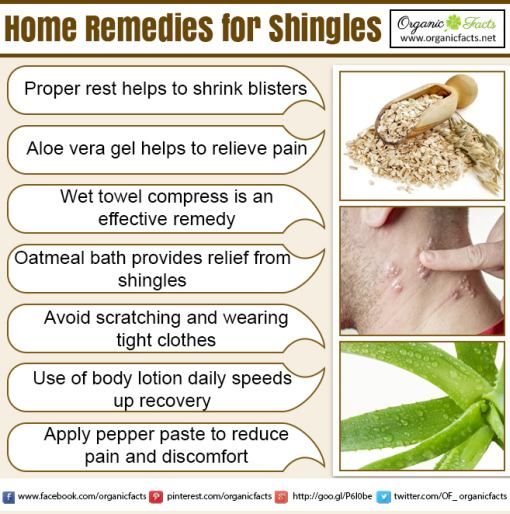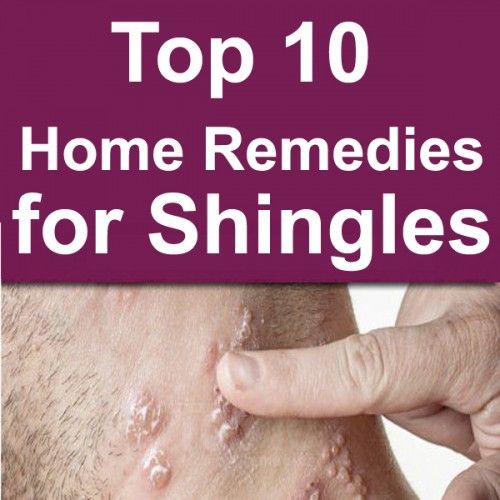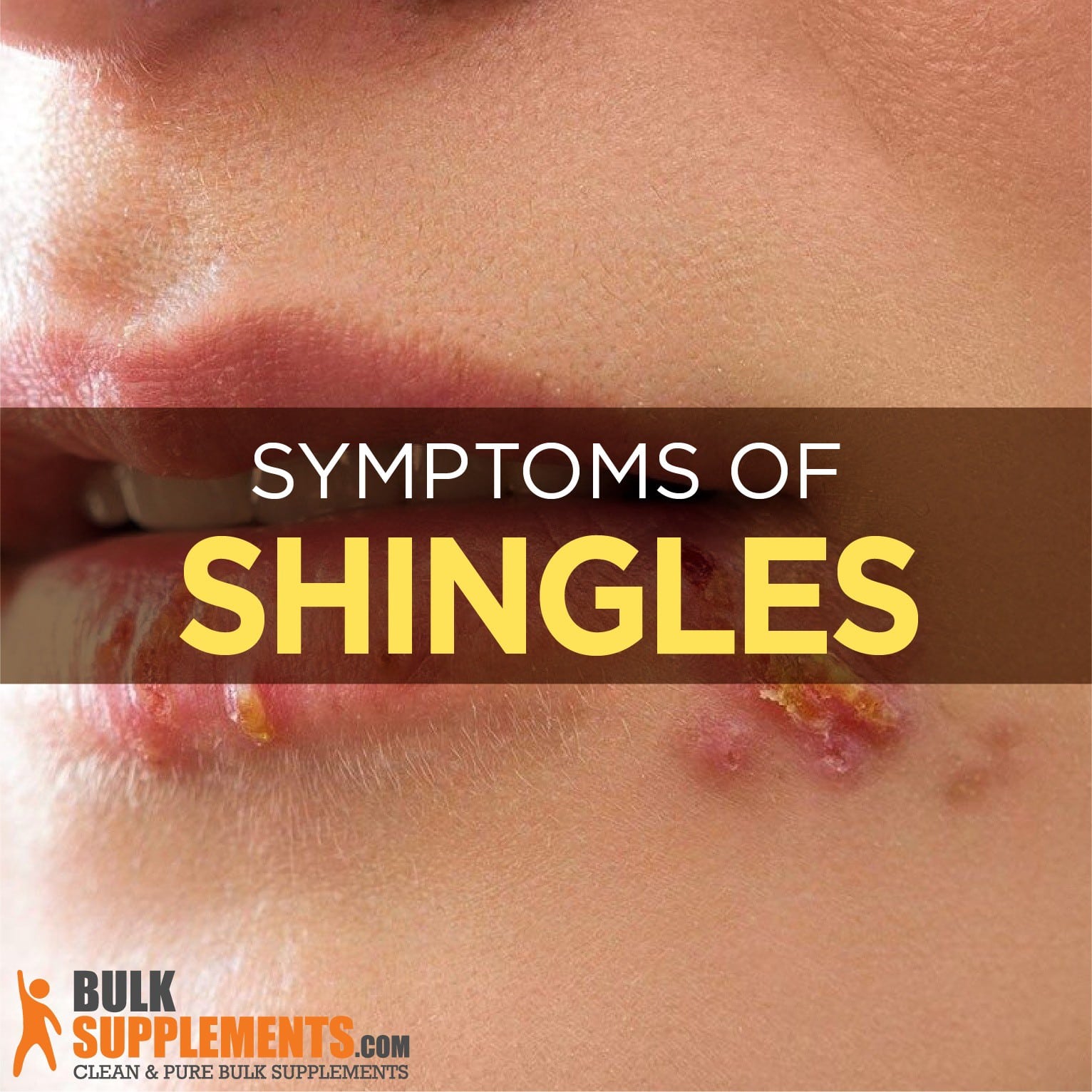General Measures To Alleviate Shingles Symptoms
Loose-fitting cotton clothes are best to reduce irritating the affected area of skin. Pain may be eased by cooling the affected area with ice cubes , wet dressings, or a cool bath. A non-adherent dressing that covers the rash when it is blistered and raw may help to reduce pain caused by contact with clothing. Simple creams may be helpful if the rash is itchy. Calamine lotion can help to cool the skin and reduce mild itchiness.
What Are Risk Factors For Shingles
Shingles can only occur in individuals who have previously been exposed to the varicella-zoster virus. Risk factors for the development of shingles include the following:
- Increasing age: Though shingles can rarely occur in children, it is much more common in older adults, with the incidence increasing with age. This is thought to be in large part due to waning immunity as people age. Approximately 50% of all cases of shingles occur in adults 60 years of age or older.
- Weakened immune system: Individuals with impaired immune systems have a higher probability of developing shingles. This can be seen in diseases such as cancer and HIV/AIDS, or in individuals taking certain medications. Patients taking steroids or other immunosuppressive medications, such as people who have undergone organ transplants, and individuals with certain autoimmune diseases are at increased risk for developing shingles.
- Psychological and emotional stressors are also thought to possibly contribute to the development of shingles, perhaps from the detrimental effects of stress on the immune system and the persons health.
Also Check: How Much Is Shingles Vaccine At Rite Aid
Should You Get The Shingles Vaccine
The shingles vaccine is safe and easy, and it may keep you from getting shingles and PHN. Healthy adults age 50 and older should get vaccinated with a shingles vaccine called Shingrix, which is given in two doses. Zostavax, a previous shingles vaccine, is no longer available in the United States.
You should try to get the second dose of Shingrix between two and six months after you get the first dose. If your doctor or pharmacist is out of Shingrix, you can use the Vaccine Finder to help find other providers who have Shingrix. You can also contact pharmacies in your area and ask to be put on a waiting list for Shingrix. If its been more than six months since you got the first dose, you should get the second dose as soon as possible. You dont need to get a first dose again.
You should get Shingrix even if you have already had shingles, received Zostavax, or dont remember having had chickenpox. However, you should not get a vaccine if you have a fever or illness, have a weakened immune system, or have had an allergic reaction to Shingrix. Check with your doctor if you are not sure what to do.
You can get the shingles vaccine at your doctors office and at some pharmacies. Medicare Part D and private health insurance plans may cover some or all of the cost. Check with Medicare or your health plan to find out if it is covered.
Read Also: Where Are Shingles Located On The Body
Can I Get Shingles If I Havent Had Chickenpox
No. You cant get shingles if youve never had chickenpox, but you can get chickenpox from someone who has shingles. If youve never had chickenpox and you come into direct contact with the oozing, blister-like rash of someone with shingles, the varicella-zoster virus can infect you and you would develop chickenpox.
Once youve had chickenpox, you could develop shingles at some point in your life. This is because the varicella-zoster virus never fully goes away after youve had chickenpox. It lies quietly inactive in your nerve tissue. Later in life, the virus may become active again and appears as shingles.
Can You Get Shingles In The Eye

Its most common to get the shingles rash on your chest, back or legs but you can get shingles on the face and eye, Rapuano says. About 15% of cases involve shingles in the eye area, he says.
However, theres a difference between having shingles around the eye and having shingles in the eye, which doctors refer to as eye involvement, Rapuano says. A patient can have shingles around the eye area without the eye itself being involved, he says.
About half of people who have shingles on the forehead or nose will also have eye involvement.
Ocular shingles typically occurs in one eye on the same side of the face as the rash. It typically occur after the shingles rash on the body has resolved, Rapuano says.
A patient who has had shingles on the face may feel like theyre healing well but then notice a symptom such as redness in the eye. When this happens, patients need to see an eye doctor right away, Rapuano says.
Also Check: What Causes Shingles To Occur
If My Shingles Rash Is Mild Or Has Mostly Healed Do I Need To See A Doctor
Its a good idea to see a doctor whenever you have a case of shingles, no matter how mild.
Prompt antiviral treatment not only decreases the duration and severity of the rash but can also decrease the chance of developing post-herpetic neuralgia. Post-herpetic neuralgia is a complication of shingles characterized by long-term, debilitating pain.
If your rash has mostly healed, its still a good idea to see a doctor so they can monitor the rash for changes or complications, such as a bacterial skin infection that forms on top of your existing rash. This is known as a superimposed infection.
Where Does Shingles Come From
When you have chickenpox as a child, your body fights off the varicella-zoster virus and the physical signs of chickenpox fade away, but the virus always remains in your body. In adulthood, sometimes the virus becomes active again. This time, the varicella-zoster virus makes its second appearance in the form of shingles.
Also Check: How To Care For Shingles At Home
Who Should Not Be Vaccinated With Shingrix
You shouldnt receive the Shingrix vaccine if you:
- Have ever had a severe allergy to this vaccine or any ingredient in this vaccine.
- Are breastfeeding or pregnant.
- Currently have shingles.
- Are ill and have a high fever.
- Have tested negative for immunity to varicella-zoster virus .
Ask your healthcare provider if the benefits of getting the vaccine outweigh any potential risks.
Questions To Ask Your Doctor
- Ive had chickenpox. Am I at risk of developing shingles?
- What is the best treatment for my shingles?
- The pain from shingles isnt going away. What can I do to make myself more comfortable?
- Im on treatment for shingles. When should I call my doctor if things dont get better?
- I have shingles and my children havent had the chickenpox vaccine. Should I get them vaccinated?
- Is the shingles vaccine right for me?
- Are there any risks associated with the shingles vaccine?
- Will my post-herpetic neuralgia ever go away?
- If Ive never had the chickenpox, should I still get the shingles vaccination?
Also Check: What Does Shingles Look Like When You First Get It
What Are The Symptoms Of Shingles
The initial symptoms of shingles include:
- a burning, tingling or itching sensation
- a stabbing sensation
- numbness in the affected area of the body
- sensitivity to light
- fever and/or headache
Two to 3 days after these symptoms appear, a painful rash will appear on the sensitive area of skin, usually on one side of the body in the area of one skin nerve .
At first this rash consists of painful red bumps that quickly develop into fluid-filled blisters, which will eventually have a crusty surface. The rash can last for 10 to 15 days.
If You Have More Than One Area Of Blisters What Can You Expect If You Go To The Hospital
Its important to note that most people with shingles dont need to be in a hospital, but if you do:
- Youll be in a contact isolation room.
- The door will be kept closed.
- A sign on your door will remind people who have never had chickenpox or the vaccine not to enter.
- The sign will also remind staff to wear gowns and gloves when entering the room.
Also Check: What Are The Beginning Signs Of Shingles
Shingles Chickenpox And Pregnancy
An attack of shingles during pregnancy will not harm the unborn baby. The mother is already carrying the varicella zoster virus before developing shingles and there is no increase in the risk of passing it on to the fetus if shingles develops. However, an attack of chickenpox during pregnancy can be serious and requires urgent medical attention.
Should I See A Doctor For Shingles

It is usually worth seeing a doctor to be certain about the diagnosis and to see if you need treatment or not. Ideally you should see a doctor as soon as possible after the rash appears.
The rash of shingles can be very painful. So even if the doctor doesn’t think you need an anti-shingles medicine, they may be able to give you stronger painkillers than those you can buy over the counter from the chemist.
Don’t Miss: How Long Can Shingles Last
Rebooting The Nervous System
Its like restarting a computer, Dr. Rosenquist says. When its running slowly or acting weird, you restart it. We are trying to turn that nerve off. When it comes back on, hopefully, it will send an appropriate transmission as opposed to a pain transmission.
Treatmentoptions for PHN patients include:
Patientswith refractory PHN rarely need opioid pain medication. However,you should be evaluated by a physician. We cant make a blanket statement abouttreatment. It is individualized, she says.
How Common Is Shingles
Shingles is an infection of a nerve and the area of skin supplied by the nerve. It is caused by a virus called the varicella-zoster virus. It is the same virus that causes chickenpox. Anyone who has had chickenpox in the past may develop shingles. Shingles is sometimes called herpes zoster.
About 1 in 4 people have shingles at some time in their lives. It can occur at any age but it is most common in older adults . After the age of 50, it becomes increasingly more common as you get older. It is uncommon to have shingles more than once but some people do have it more than once.
Don’t Miss: How Does One Get Shingles Virus
Can You Spread Shingles Over Your Own Body
Shingles cannot be spread over different areas of your body. For example, if you have an active shingles rash on your back, the fluid from the blisters cannot cause a new rash on your arm.
However, the fluid could potentially spread VZV to someone else if theyve never had chickenpox or received the chickenpox vaccine.
One caveat here is that some people can develop disseminated herpes zoster, which is when the shingles virus causes a rash over multiple areas of the body. This can happen in people who have weakened immune systems from autoimmune disease, cancer, or immunosuppressant medications.
Can You Get Shingles From The Covid
There have been a few reports of shingles happening in people who were vaccinated against COVID-19. The varicella-zoster virus was reactivated in these people.
A note from Cleveland Clinic
If youve had chickenpox, youre at risk of developing shingles later in life. Shingles causes a rash that is contagious and painful. The disease can have serious complications. The best thing you can do to reduce your risk is to get the shingles vaccine. The vaccines are safe and effective.
Also Check: How Long Does Shingles Pain Last
Stay Away From Certain Groups Of People If You Have Shingles
You cannot spread shingles to others. But people who have not had chickenpox before could catch chickenpox from you.
This is because shingles is caused by the chickenpox virus.
Try to avoid:
- pregnant people who have not had chickenpox before
- people with a weakened immune system like someone having chemotherapy
- babies less than 1 month old unless you gave birth to them, as your baby should be protected from the virus by your immune system
Skin Care And Itch Relief For Shingles
To relieve itching and discomfort, try:
- A cool, wet compresses on the affected skin
- Soothing baths and lotions, such as colloidal oatmeal bath, starch baths, or calamine lotion
- Zostrix, a cream that contains capsaicin
- Antihistamines to reduce itching
Keep your skin clean. Throw away bandages you use to cover your skin sores. Throw away or wash in hot water clothing that has contact with your skin sores. Wash your sheets and towels in hot water.
While your skin sores are still open and oozing, avoid all contact with anyone who has never had chickenpox, especially pregnant women.
Don’t Miss: Does Humana Cover Shingles Vaccine 2020
What Problems Can Happen
Most cases of shingles heal on their own, with or without treatment, and wont lead to any other problems. In rare cases, shingles can lead to complications, including:
- Ongoing pain : Damaged nerve fibers in the skin send confused messages to the brain, leading to pain. Pain can go on for a long time after the shingles rash is gone. This is the most common shingles complication.
- Vision problems: Shingles near or in an eye can lead to vision loss.
- Skin infections: A shingles rash can become infected with bacteria, leading to impetigo or cellulitis.
- Nervous system problems: Shingles on the face can involve different nerves that connect to the brain. This can lead to nerve-related problems such as facial paralysis, hearing problems, and problems with balance. In very rare cases, shingles can lead to encephalitis .
Check If You Have Shingles

The first signs of shingles can be:
- a tingling or painful feeling in an area of skin
- a headache or feeling generally unwell
A rash will appear a few days later.
Usually you get the shingles rash on your chest and tummy, but it can appear anywhere on your body including on your face, eyes and genitals.
The rash appears as blotches on your skin, on 1 side of your body only. A rash on both the left and right of your body is unlikely to be shingles.
Also Check: Can Shingles Vaccine Cause Swollen Lymph Nodes
When To Seek Medical Advice
Shingles is not usually serious, but you should see your GP as soon as possible if you recognise the symptoms. Early treatment may help reduce the severity of your symptoms and the risk of developing complications.
You should also see your GP if you are pregnant or have a weakened immune system and you think you have been exposed to someone with chickenpox or shingles and haven’t had chickenpox before.
What Should I Expect Will Happen To Me If I Get Shingles
Shingles can be a very painful condition. If you think you have the symptoms of shingles, see your healthcare provider right away. Starting antiviral medications early can ease your discomfort and reduce the duration of your symptoms.
A better approach to shingles is to take action and do what you can to lessen your risk of getting it. If you never had shingles or had a bout of them in the past, talk to your healthcare provider about getting the shingles vaccine. If youve never had chickenpox, talk with your healthcare provider about getting the chickenpox vaccine.
Read Also: What Do Shingles Look Like When They Start
Shingles And Chickenpox Vaccination
The National Immunisation Program provides a free shingles vaccine, Zostavax® at 70 years of age . There is also a free catch-up program for 71 to 79 year olds until the end of 2021. The Zostavax® vaccine is available on prescription for people aged 50 to 69 years and from 80 years but it must be paid for by the patient.
Zostavax® vaccine contains live attenuated varicella-zoster virus, containing 14 times more virus than childhood varicella vaccines and is contraindicated in immunocompromised people. Zostavax® vaccine should not to be used in people with compromised immune function due to the risk of disseminated disease from the vaccine virus.
- Safety advisory – Zostavax® vaccine for health professionals and consumers
Vaccination is still recommended for people who have had shingles infection in the past. It is recommended to wait at least a year after recovery.
The NIP provides a free chickenpox vaccine to children aged 18 months of age and as catch-up for children up to 20 years of age as part of the No Jab No Pay legislation. People aged 14 years and older require two doses of the chickenpox vaccine, one to two months apart. People from 20 years of age must purchase the vaccine privately.
Is Shingles Contagious
It is not possible to catch shingles from someone else with the condition, or from someone with chickenpox.
However, it is possible for someone who has never had chickenpox to catch it from someone with shingles, as the shingles blisters contains the live virus.
In the UK, chickenpox is so common during childhood that 9 out of 10 adults have already had it and will not be at risk from someone with shingles.
Read Also: Where Does Shingles Show Up On The Body